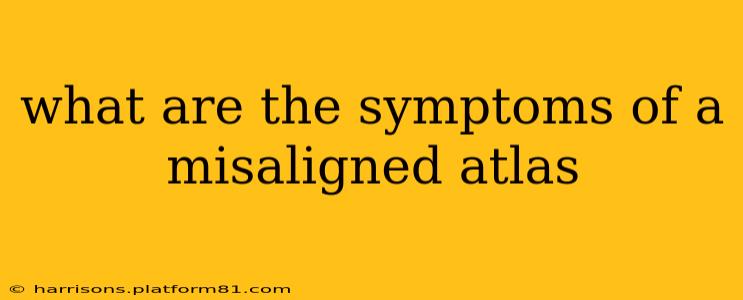The atlas, the topmost vertebra in your neck (C1), plays a crucial role in supporting your head and facilitating its movement. A misalignment, also known as atlas subluxation, can cause a wide array of symptoms, impacting various parts of your body. It's important to note that diagnosing an atlas misalignment requires a professional assessment, and the symptoms listed below can also be indicative of other conditions. Always consult a qualified healthcare professional for diagnosis and treatment.
What is an Atlas Misalignment?
Before delving into symptoms, let's briefly define what an atlas misalignment entails. It's a condition where the atlas vertebra is slightly out of its optimal position, potentially affecting the alignment of the entire spine and interfering with the nervous system's function. This misalignment can result from various factors, including trauma (e.g., whiplash), poor posture, and repetitive strain.
Common Symptoms of an Atlas Misalignment
The symptoms of an atlas misalignment are diverse and can vary significantly depending on the individual and the severity of the misalignment. Some common symptoms include:
- Headaches: Frequent headaches, particularly tension headaches or migraines, are a frequently reported symptom. The misalignment can affect blood flow and nerve pathways in the head and neck.
- Neck Pain: Stiffness, pain, and limited range of motion in the neck are common. This can range from mild discomfort to severe, debilitating pain.
- Shoulder Pain: Pain or discomfort radiating to the shoulders is another common presentation. The misalignment can affect the nerves and muscles that control shoulder movement.
- Back Pain: Surprisingly, atlas misalignment can also contribute to back pain. The interconnectedness of the spine means that a problem in one area can affect others.
- Postural Issues: Poor posture, such as rounded shoulders or forward head posture, is frequently observed. This is a direct result of the altered biomechanics caused by the misalignment.
- Dizziness and Vertigo: Some individuals experience dizziness, vertigo, or balance problems. This is likely due to the atlas's proximity to the inner ear and brainstem.
- TMJ Problems: Temporomandibular joint (TMJ) disorders, characterized by jaw pain and clicking, can sometimes be linked to atlas misalignment.
- Fatigue: Chronic fatigue and low energy levels are sometimes reported by those with an atlas misalignment. This could be related to general discomfort or nerve interference.
- Numbness and Tingling: In some cases, individuals might experience numbness or tingling in the arms or hands due to nerve compression.
Less Common, but Still Possible, Symptoms
While the above are the most commonly reported symptoms, some individuals may also experience:
- Visual Disturbances: Blurred vision or double vision.
- Hearing Problems: Tinnitus (ringing in the ears) or other auditory issues.
- Emotional Disturbances: While not directly caused by the misalignment, the constant pain and discomfort can contribute to stress, anxiety, or depression.
Can an Atlas Misalignment Cause Other Health Problems?
H2: What other health problems can be caused by an atlas misalignment?
The potential for an atlas misalignment to contribute to other health problems is a subject of ongoing research and debate within the healthcare community. While some practitioners believe it can indirectly influence various systems in the body through its impact on the nervous system, more extensive studies are needed to establish definitive causal links.
How is an Atlas Misalignment Diagnosed?
H2: How is a misaligned atlas diagnosed?
Diagnosing an atlas misalignment typically involves a thorough physical examination by a chiropractor or other qualified healthcare professional. Imaging techniques like X-rays may be used to visualize the alignment of the atlas vertebra. However, it's crucial to understand that subtle misalignments may not always be readily apparent on X-rays.
What Treatments are Available for an Atlas Misalignment?
H2: What are the treatments for a misaligned atlas?
Treatment options for an atlas misalignment vary depending on the severity of the condition and the individual's overall health. Chiropractic adjustments are a common approach, aiming to gently reposition the atlas vertebra. Other treatments may include physical therapy, massage therapy, and lifestyle modifications to improve posture and reduce stress.
Disclaimer: This information is for educational purposes only and should not be considered medical advice. Always consult with a qualified healthcare professional for any health concerns or before making any decisions related to your health or treatment.
